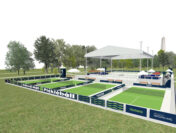“This is my interpretation of J. Paul’s 25 years later,” laughed owner Paul Cohn at a preview tasting of his new Boss Shepherd’s, an 1880-1920s era restaurant and lounge serving farm-to-table American classics, right next door to DC’s historic Warner Theatre.
And from the moment you step down into this hidden gem in the theatre district, you’ll feel like a boss.
Now, the attitude and atmosphere may be classic, but the menu has a decidedly now focus on local first — for bites and at the bar. The menu draws from local farms, instilled with Chef Jeremy Waybright’s southern inspiration and features twists on time-honored classics (read: Chicken Pot Pie Fritters!!) The turn of the century bar — with some bourbon and rye labels you may not see anywhere else — puts the spotlight on local distilleries and local craft beers. “Six of the eight taps are local within 60 miles of the front door,” boasts General Manager Daniel Mahdavian.
(But wait! Before you go overboard on the Old Fashioneds, take note that Boss Shepherd’s serves Veuve by the glass… from magnums. No, that doesn’t make it taste any different… but what a way to show somebody who’s boss!)
The man, the myth, the legend of Boss Shepherd may have put a few people into a pickle (or pulled friends out of one), so of course, guests can expect pickling to be a big part of the menu. We recommend the Pickled White Shrimp. Want down home flavor? You can’t top the Fried Chicken, served with butter-poached radish, smoked egg yolk, hot sauce and a biscuit — or the Carolina Trout with Meyer lemon, capers, brown butter and Wade’s Mill white grits.
There have been Boss Shepherd’s before, but none as big boss as this!
So who is the Boss? A quick wiki search explains that: “Alexander Robey Shepherd (January 30, 1835 – September 12, 1902), better known as Boss Shepherd, was one of the most controversial and influential civic leaders in the history of DC, and one of the most powerful big-city political bosses of the Gilded Age.” Governor of DC for only one year 1873-1874, it was due to his urging that DC’s disparate “city” neighborhoods were bound together to form one DC.

![[Vid] A First Look Inside Nats Ballpark for the 2024 Season](http://kstreetmagazine.com/wp-content/uploads/2024/03/EEB50F04-B719-4F75-B5C2-478029C3230B_1_105_c-176x133.jpeg)


